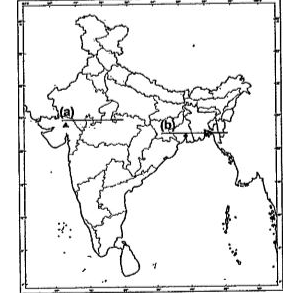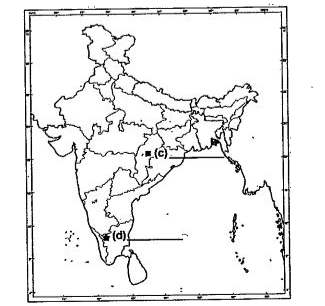Which Indian Journalist was honoured with India's Most Powerful Women in Media Award during the prestigious Confluence Excellence Award ceremony held in the British parliament on 27 September 2019?
A
1. Sona Choudhary
B
2. Suneta Chaudhary
C
3. Anubha Bhonsle
D
4. Kalli Puri
Video Solution
Text Solution
The correct Answer is:D
Explanation: Indian journalist Kallie Puri was honoured with “India.s Most Powerful Women in Media” award. She received the global honour at the prestigious Confluence Excellence Awards at the British Parliament on September 27, 2019.
|
Updated on:21/07/2023
Related Playlists
- BOOK - PINNACLECHAPTER - CURRENT AFFAIRSEXERCISE - PERSON105videos
CURRENT AFFAIRS
- BOOK - PINNACLECHAPTER - CURRENT AFFAIRSEXERCISE - STATE55videos
CURRENT AFFAIRS
- BOOK - PINNACLECHAPTER - CURRENT AFFAIRSEXERCISE - Miscellaneous.164videos
CURRENT AFFAIRS
- BOOK - PINNACLECHAPTER - CHEMISTRYEXERCISE - MISCELLANEOUS38videos
CHEMISTRY
- BOOK - PINNACLECHAPTER - ECONOMICSEXERCISE - MCQ (MISCELLANEOUS)54videos
ECONOMICS
Similar Practice Problems
- Question 1 - Select One
Which Indian journalist was honored with India's Most Powerful Woman in Media Award during the prestigious Confluence Excellence Award ceremony held in the British parliament on 27 September 2019?
AAnubha BhonsleBSunetra ChaudharyCKalli PuriDSona Choudhary - Question 1 - Select One
Which of the following Indian Journalists was one of the recipients of the 2019 Ramon Magsaysay Award?
ARavish KumarBRajdeep SardesaiCBarkha DuttDArnab Goswami - Question 1 - Select One
Which of the following Indian journalists was one of the recipients of the 2019 Ramon Magsaysay Award?
ABarkha DuttBRavish KumarCArnab GoswamiDRajdeep Sardesai - Question 1 - Select One
Which district has been awarded the Plastic Waste Management Award -2020 for being the best district of India in the plastic waste management category during Swachhta Hi Seva 2019?
AJorhatBMajuliCHojaiDDibrugarh - Question 1 - Select One
Which district has been awarded the Plastic Waste Management Award -2020 for being the best district of India in the plastic waste management category during Swachhta Hi Seva 2019?
AMajuliBHojaiCDibrugarhDJorhat - Question 1 - Select One
Consider the following statements:
1. Veteran Indian-origin civil servant Joseph Yubaraj Manuel Pillay was reappointed as the Chairman of the Presidential Council of Advisers (CPA) by Singapore President Tony Tan Keng Yam.
2. In 2012, for his public service, Pillay was awarded the Order of Nila Utama (First Class) award- one of Singapore’s most prestigious National Day Awards.
3. He was sworn in as top advisor to Singapore’s President for a period of next two years.
Which of the statements given above is/are correct?A1 and 2 onlyB2 and 3 onlyC1 and 3 onlyDAll of the above - Question 1 - Select One
Consider the following statements about 'The Charter Act of 1813'.
1. It ended the trade monopoly of the East India Company in India except for trade in tea and trade with China.
2. It asserted the sovereignty of the British Crown over the Indian territories held by the Company.
3. The revenues of India were now controlled by teh British Parliament.
Which of the statements given above are correct?A1 and 2 onlyB2 and 3 onlyC1 and 3 onlyD1, 2 and 3 - Question 1 - Select One
He wasn't the first, nor would he be the last, but the wiry, bespectacled man from Gujarat is certainly the most famous of the world's peaceful political dissidents.
Mohandas Gandhi – also affectionately known as Mahatma – led India's independence movement in the 1930s and 40s by speaking softly without carrying much of a big stick, facing down the British colonialists with stirring speeches and non-violent protest. More than anything else, historians say, Gandhi proved that one man has the power to take on an empire, using both ethics and intelligence.
Urges Britain to quit India It is hard to imagine the thin, robed Gandhi working in the rough and tumble world of law, but Gandhi did get his start in politics as a lawyer in South Africa, where he supported the local Indian community's struggle for civil rights. Returning to India in 1915, he carried over his desire to improve the situation of the lower classes.
Gandhi quickly became a leader within the Indian National Congress, a growing political party supporting independence, and traveled widely with the party to learn about the local struggles of various Indian communities
It was during those travels that his legend grew among the Indian people, historians say.
Gandhi was known as much for his wit and intelligence as for his piety. When he was arrested several more times over the years for his actions during the movement, Gandhi calmly fasted in prison, believing that his death would embarrass the British enough to spur independence, which had become the focus of his politics by 1920.
Gandhi's non-cooperation movement, kicked off in the early 1920s, called for Indians to boycott British goods and traditions and become self-reliant. His most famous protest came in 1930, when Gandhi led thousands of Indians on a 250-mile march to a coastal town to produce salt, on which the British had a monopoly.
According to the passage, British had a monopoly of producing which of the product?AIndigoBKhadiCSaltDRice - Question 1 - Select One
Read the passage carefully and select the best answer to question out of the given four alternatives.
PASSAGE - III
He wasn.t the first, nor would he be the last, but the wiry, be spectacled man from Gujarat is certainly the most famous of the world.s peaceful political dissidents.
Mohandas Gandhi - also affectionately known as Mahatma-led India.s independence movement in the 1930s and 40s by speaking softly without carrying much of a big stick, facing down the British colonialists with stirring speeches and non-violent protest. More than anything else, historians say, Gandhi proved that one man has the power to take on an empire, using both ethics and intelligence.
Urges Britain to quit India
It is hard to imagine the thin, robed Gandhi working in the rough and tumble world of law, but Gandhi did get his start in politics as a lawyer in South Africa, where he supported the local Indian community.s struggle for civil rights. Returning to India in 1915, he carried over his desire to improve the situation of the lower classes.
Gandhi quickly became a leader within the Indian National Congress, a growing political party supporting independence, and travelled widely with the party to learn about the local struggles of various Indian communities.
It was during those travels that his legend grew among the Indian people, historians say.
Gandhi was known as much for his wit and intelligence as for his piety. When he was arrested several more times over the years for his actions during the movement, Gandhi calmly fasted in prison, believing that his death would embarrass the British enough to spur independence, which had become the focus of his politics by 1920.
Gandhi.s non-cooperation movement, kicked off in the early 1920s, called for Indians to boycott British goods and traditions and become self-reliant. His most famous protest came in 1930, when Gandhi led thousands of Indians on a 250- mile march to a coastal town to produce salt, on which the British had a monopoly.
According to the passage, British had a monopoly of producing which of the product?AIndigoBKhadiCSaltDRice



